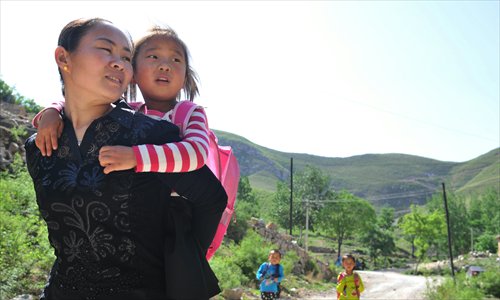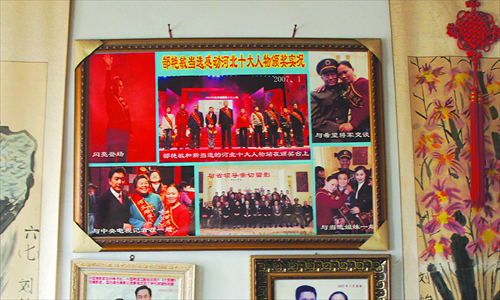Controversy over an abducted woman-turned ‘role model’ sparks discussions on women’s rights
The story of Gao Yanmin, an abducted woman-turned substitute teacher in a hilly village in Hebei Province, just 200 kilometers away from the center of Beijing, is full of paradoxes. She defends the man who bought her and the man's son who forced her to be his wife, locked her up and beat her. After becoming pregnant twice, with little chance of ever finding another husband, she had no option but to stay. And by becoming a teacher in the village, she has been trying to build a meaningful life for herself.

Gao Yanmin walks her students home on May 13, 2015. Photo: CFP

Pictures of Gao receiving her "the top 10 figures that have most moved Hebei" award and photos of her with journalists cover the walls at her home in Xia'an village. Photo: Huang Jingjing/GT
Reality is sometimes much crueler than fiction. The story of Gao Yanmin, an abducted woman that became a teacher in a small village in Hebei Province, is proof of this.
Gao's story was first widely reported in 2006, 12 years after she was sold to a man in Xia'an village, Lingshan township, Quyang county. In 2007, she was hailed as one of "the top 10 figures that have most moved Hebei." In 2009, a dramatic film called The Story of An Abducted Woman inspired by her story was made, showing her as loyal to her new home and portraying the villagers as accepting her. In 2013, she was listed as one of the "top 10 most virtuous countryside teachers."
But these awards and the film have pushed Gao into limelight again recently. The filmmaker and awards committees have been accused of glorifying a crime and encouraging victims to surrender. Many people have said that the local authorities and the media are shameless in painting her as a "role model," ignoring her suffering and the scourge of human trafficking.
Chen Shiqu, director of the anti-trafficking office at the Ministry of Public Security, wrote on his Weibo that traffickers must be harshly punished and those that buy people must be held responsible.
While many netizens think that Gao should seek justice, and her father-in-law and husband, who paid 2,600 yuan ($419) for her, should be put into prison, the 39-year-old woman has asked for people to leave her and the men alone. "[The attention now] doesn't help, but hurts," Gao told the Global Times at her home, a plain brick cottage surrounded by bare hills and rocks.
She has complained of sudden police visits and interview inquires disturbing her life. She argues the people who trafficked, raped and sold her were the criminals, not her father-in-law and husband.
Trying to understand
Gao's "apathetic" response is disappointing to some netizens. While some think it's wrong to disturb her, some see Gao as ignorant and deserving of no sympathy. Some say she is a suffering from Stockholm syndrome, in which hostages develop positive feelings toward their captors, sometimes to the point of defending them. Li Sipan, director of the Women Awakening Network, a women's rights NGO based in Guangzhou, Guangdong Province said it's easy to fight for justice online.
"But we are far away from Gao's life. It's not fair to blame her without considering her conditions," Li told the Global Times on Monday. "It's common for women in China to compromise and sacrifice for their children, even though their marriage is unhappy."
Gao said she worries most about the impact of the attention on her children. Her 18-year-old daughter is to take the national college entrance examinations next year, and her 15-year-old son will take senior high school entrance exams next year.
In 1994, at Shijiazhuang train station, in the capital of Hebei, 18-year-old Gao from Henan Province, was tricked by two women who said they could find her a good job. Later she was sold to three male traffickers, one of whom raped her. In Xia'an village, she begged an old man, who later forced her to be his daughter-in-law, to buy her, according to media reports.
The small village, which has about 400 residents, has had 30 female residents that were trafficked, nearly half of whom have run away. Li Guifang, 54, from Nanning, the Guangxi Zhuang Autonomous Region, is one that chose to stay. After living there more than 30 years, she still speaks the dialect of her birthplace.
A mother of two sons and a daughter, she smiled as she told the Global Times about being sold to her husband. "I was lucky. My husband treated me well. Another woman who was trafficked here from Guangxi ran away as her husband always abused her and burnt her with cigarettes," she said.
Li, who hoped to find a life free of farm work, was tricked by traffickers who promised to find her a rich husband. However, she found that Xia'an was even poorer than her home village. She could not return home though, as she fell pregnant.
"It's shameful to go back," she said.
Trials and tribulations
Li Sipan says that Gao never resigned herself to her fate and has been trying to build her authority in the family and prestige in the village.
In the film The Story of An Abducted Woman, her husband didn't force her to be his wife, the family treated her well and they never stopped her from leaving. The villagers respected her for her devotion to education and rushed to donate blood when she fell down in a hill. When her mother and boyfriend came to fetch her, Gao refused to leave, as she wanted to repay the village. But this is not the true story.
Forced to marry an illiterate husband, she tried to flee and attempted to kill herself. During the first year in Xia'an, she was confined to her husband's home. But she gradually came to accept her situation and eventually had two children with her husband. In 1995, she had a chance to return to Henan to see her parents with her husband. But her parents told her to go back to Hebei, saying "your husband's family would lose both a woman and money" and "it's not easy for [a non-virgin] to marry again," according to a 2006 report in South Reviews magazine.
In 2001 Gao, a junior high school graduate who was the best-educated person in Xia'an, was persuaded to be a teacher in the village's primary school. That job gave her a new reason to stay, after she gave birth to two children.
The Yanzhao Metropolis Daily, a newspaper based in Shijiazhuang, first reported Gao's story in May 2006. Later that year, scores of media outlets interviewed her. Donations flooded in.
Her husband reportedly no longer beat her after she got famous. But a friend of hers recently revealed to media that her husband still beats her after he loses money on gambling. But Gao denies this, telling the Global Times that conflicts between a couple are inevitable in first few years.
Gao spent the donations on the village, building roads, supporting students and elderly people. But her kindness was not met with gratitude. During the interview last week in the village, some villagers accused her of monopolizing donations. Some complained the village's name has been tarnished by the attention, making it harder for the young men to find wives.
Gao, who now teaches more than 20 preschool students in the village and has a monthly income of 600 yuan, feels wronged by these accusations.
As a matter of fact, the township established a foundation in 2006, which managed all the donations to the village. She even gave the foundation a donation of $250 from a Chinese American who clarified she could spend it on herself.
Poverty, jealousy, ignorance and poor legal awareness were all blamed for the villagers' indifference to Gao.
Legal awareness
"It's pity that most people focused on Gao, but forget the legal issues," Li Sipan said. China's 1997 Criminal Law stipulated that a person who purchases trafficked people and prevents them from leaving could be sentenced to up to three years in jail.
"In reality, those who buy people are rarely held responsible, even those who imprison others," Li noted. "Besides, Gao's case happened before 1997, which means her father-in-law and husband cannot be arrested."
The new amendment to the law, which is now waiting for lawmakers' approval, say that buyers who allow people to leave are also committing a crime, but can be treated leniently or not be punished at all. Li believes it's progress but she calls for the part about possible penalty exemptions to be removed.
Many netizens have vented their anger toward the Yanzhao Metropolis Daily, the organizer of the "figures that moved Hebei" and "the most virtuous countryside teachers," the director of the "whitewashed" film and its lead actress.
Qi Shengyong, a reporter with the newspaper whose reports were criticized for being one-sided and neglecting women's rights, was hunted down by netizens. Claiming he was defamed, he argued on his Weibo that his story was focused on helping her to get on the list of "virtuous countryside teachers" as the prize might help her to improve her conditions.
He also clarified that he has written many reports since 2006 on Gao's situation and history. "And we underplayed her suffering in later reports as the readers knew about it already. Repeated detailed reports would hurt Gao," Qi said.
Wang Like, who played Gao in the film, said on her Weibo that she would no longer play such roles.
Li Yang, director of Blind Mountain, a 2007 film about an college graduate who was kidnapped and sold as a bride in a mountain village in Shaanxi Province, also criticized some directors and producers for making works that are far from reality. "The truth is always brutal. I'd rather the audience feel the film is much crueler than reality after walking out of the cinema, than they complain that real life is so damn horrible after watching whitewashed films," Li said on his Weibo.
Virginity matters
Luo Ruixue from the Women Awakening Network who published a widely-reposted article online entitled "The abducted woman praised as the most virtuous teacher is a nation's shame" said she hopes that the case will push the government to be more accountable for such cases. "I want to know whether the government is able to prevent the emergence of a second Gao Yanmin," Luo told the Global Times.
Qi said the police investigated the trafficking after his reports in 2006, but nothing ever came of it.
Li Lijuan, Gao's friend, said it's wrong to be cynical about her kindness. "Gao could leave before she was awarded the titles. But she told me she was reluctant to leave her students," Li told the Global Times. "She deserved the titles and her story can encourage many other people to help countryside education," Li said.
But she believes that the local authorities were negligent in dealing with human trafficking. "In my hometown, even the village head purchased kids. And the police turned a blind eye," she lamented.
The debate has increased people's knowledge of human trafficking, Li Sipan said. She said that the greater awareness of women rights and social media both contributed to this. "Back in 2006, there were just a few major news portals and not many people can log on to the Internet. Now the ordinary people could make their voice heard which can form a big opinion force."
The general attitude towards human trafficking, domestic violence and women rights still need to be updated, so that neighbors, community workers, village officials and police should get involved immediately in such cases, she said.
"But as long as we still value a woman's virginity, we are not helping victims like Gao who have limited options to seek help and freedom."
Newspaper headline: The trafficked teacher